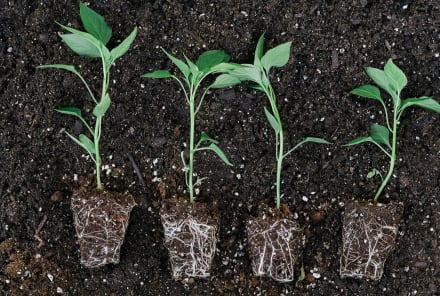Advertisement
How Mindfulness Can Lead To More Sustainable Behavior, According To Research


We all know what it's like to have a busy day when cortisol levels are high and energy levels are low. And when we are already feeling tired and unmotivated, there's little head space left to think about the impact we're having on the environment.
I noticed this myself while working a corporate job with early morning shifts. Because of the exhaustion, I made less of an effort to bring reusable cutlery and boxes to work and I didn't always make time to clean my single-use plastic boxes for recycling. On the weekends, when I was more rested and clearheaded, it was way easier to be mindful of my impact and consumption.
This disconnect speaks to a larger issue that is plaguing the sustainability movement. In her TED talk titled How Silence Can Lead to a More Sustainable World, regenerative leader Laura Storm touches on it by saying, "Can we reduce mass consumption and mass production when we constantly work too much ourselves?"
We need to recognize that sustainability starts from within us. In order to change our impact on the Earth, we need to change the way we relate to ourselves.
How mindfulness can promote pro-environmental behavior
Most global citizens are increasingly aware of the climate crisis. Despite this, polls show there is a gap between what consumers say about their growing concern for the planet and what they actually do about it.
This is called the "green-attitude behavior gap1." As for what we can do to close it, a 2023 study published in the Sustainability Journal indicates that establishing a mindfulness practice2 could make a big difference.
Rooted in Buddhist psychology, mindfulness is defined3 as nonjudgmental attentiveness to the present moment. Mindfulness practices are known to come with cognitive benefits and reduce emotions like anxiety. But how can they lead to more sustainable choices?
Mindfulness makes us more compassionate
Researchers argue that it all comes down to the way mindfulness strengthens our empathy and compassion4. Mindfulness also seems to bolster other prosocial tendencies, such as altruism.
This can help us more deeply relate to the communities (human and nonhuman) that are most impacted by climate change.
It helps strengthen our values
In a 2020 study called The Way Forward in Mindfulness and Sustainability: A Critical Review and Research Agenda5, researchers established a few ways mindfulness and pro-environmental behavior (PEB) go hand in hand. One of which was that mindfulness gives us an increased awareness of our individual behavior.
In a similar vein, mindfulness is correlated with stronger intrinsic values and ethical decision-making. It appears to have a negative correlation with egocentrism5 and be effective at helping us clarify our goals and values.
It makes us less compulsive
Since mindfulness is correlated with decreased automatic and impulsive behavior, it may also lead to more conscious consumption. A study conducted in India found that consumers who exercised more mindfulness while shopping made fewer impulsive buying decisions.
Summary
How to put these principles into action
Here are five things you can start doing right now to become more mindful—and maybe even more sustainable too:
Practice breathwork
Breathwork is an effective way to bring your attention to the present moment. There are many types of breath meditations, including cyclic sighing, box breathing, Nadī Shodhana (alternate nostril breathing), etc., so choose one that resonates with you.
Do a lovingkindness meditation (LKM)
The aim of lovingkindness meditation is to cultivate love and forgiveness for yourself and all those around you. A 2019 study found entrepreneurs who engaged in a brief lovingkindness meditation demonstrated more compassion and a higher level of sustainable decision-making.
Try a walking meditation
Walking meditation is a form of meditation commonly associated with the Zen tradition. Buddhist monk Thich Nhat Hanh believed that paying attention to the feeling of one's feet on the ground can increase our sense of connectedness with nature.
A 2023 study titled Breath, Love, Walk2 found that there was, in fact, a direct link between walking meditation and pro-environmental behavior and support of climate policy.
Other active forms of meditation can also cultivate mindfulness. Try practicing mindfulness while jogging or gardening to help to calm your mind when you don't feel like sitting still.
Find time to connect with nature
Carve out time for forest bathing, swimming in the ocean, or getting grounded (literally walking with your bare feet on the soil). Research shows spending even 20 minutes in nature6 is enough to help us unwind and lower the stress hormone cortisol.
Tap into your five senses
Going through your five senses by thinking about what you are seeing, hearing, smelling, tasting, and touching is a quick way to ground yourself in the present moment when you don't have time to meditate.
The takeaway
When we lead healthier, more balanced lives, we may find it easier to act more consciously and take better care of our environment. Consider this yet another reason to try to be more mindful today and every day.
6 Sources
- https://www.sciencedirect.com/science/article/abs/pii/S0959652620326032
- https://www.mdpi.com/2071-1050/15/13/10491
- https://www.frontiersin.org/articles/10.3389/fnhum.2019.00208/full
- https://www.sciencedirect.com/science/article/abs/pii/S0921800914001165
- https://link.springer.com/article/10.1007/s41465-020-00180-6
- https://www.ncbi.nlm.nih.gov/pmc/articles/PMC6458297/











